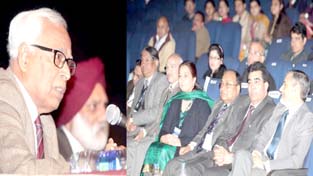
Nishikant Khajuria
Jammu, Feb 6: Expressing his annoyance over failure of different agencies in transforming the words into action, Governor N N Vohra today stressed the need to put things together for sustainable development of Jammu and Kashmir.
“There is collective failure on our part in transforming what we say since we don’t work together on future strategy for achieving the desired goal,” he said while complaining to the Jammu University for not inviting representatives of Government Departments in the discussions on future strategies and opportunities on sustainable development of the State.
Mr Vohra was giving concluding remarks in Prof Ram Nath Chopra Symposium on the topic `Science and Technology Imperative and Opportunities for Sustainable Development of J&K’ on fourth day of the ongoing Indian Science Congress at Jammu University.
This was for the first time in history of Indian Science Congress that Governor of the State chaired a session for more than two hours.
“Jammu University should have invited Planning Department, Science and Technology, Bureau of Economics, Agriculture Production etc in the session, which was of great value for them as two Vice-Chancellors and heads of important institutions were speaking on various measures for sustainable development of J&K,” Mr Vohra said after he did not find even a single officer from any Government Department in the interaction.
He stressed the need for synergy of efforts between different universities, Research Institutions and the Government Departments for developing cheaper equipments to help poor breeders to upgrade strategy and system for more cultivation and sustainable development of J&K.
Mr Vohra also expressed his disappointment over not very meaningful partnerships between Government agencies and the private players. “One of the weak areas in our country is that we don’t have effective and meaningful partnerships which could really transfer benefits of knowledge and technology to the farmers and commoners,” he said.
The Governor also put some queries to the Speakers and suggested that a document based on the presentations made by the panelists should be prepared and submitted to the State Government for appropriate action.
JU Vice-Chancellor Prof Mohan Pal Singh Ishar was coordinating the programme in which Vice-Chancellor of Kashmir University, Vice Chancellor of SKUAST-Kashmir, Director IIIM Jammu, Director Research SKUAST-Kashmir, Director Research SKUAST-Jammu and Director DIHAR delivered lectures with power point presentations.
Prof Talat Ahmad, Vice Chancellor, KU, delivered lecture on topic “Earth and Solar Resources as influencing factors of sustainable development of J&K”. He threw light on two aspects of how glaciers are to be sustained and their importance and other on, various scientific reasons leading to earthquake and to protect ourselves from such disasters.
Dr Ram Vishwakarma, Director IIIM Jammu, dwelt in detail on the topic entitled “Opportunities for Aroma Industry in J&K: Creation of new Industrial Biotechnology Parks”. He stressed upon J&K having specific opportunity to emerge as an Aroma industrial unit and shared about the scientific infrastructure, various prototype projects that have been started in J&K and introduction of various crops for Aroma industry.
Dr Tej Partap, Vice Chancellor, SKUAST Kashmir, spoke on the topic `Converting unsustainable to sustainable farming economy in J&K’. He spoke on the technology factors.
Dr Ajay Koul, Director Research, SKUAST Jammu, delivered lecture on topic “Technological breakthroughs that can help transform Temperate Sericulture based livelihood Economy of J&K farmers”. He focused on current status, components and various factors that are affecting Silkworm rearing and major constraints coming in-between them and various precautions such as Pre rearing disinfection, leaf for Chawki worm, leaf storage, leaf sizing, bed cleaning, moulting care etc to be taken for good silkworm rearing.
Dr Shafiq Wani, Director Research, SKUAST Kashmir, spoke on breaking the technology barriers in major niches for economic transformation of the farmars in Jammu, Kashmir and Ladakh. He stressed on the imperatives and opportunities of bringing in ‘Kashmiriat’ in farm research.
Dr R B Shrivastva, Director, DIHAR, Leh spoke on how the basket of technologies can transform the economy of people of cold arid region of Ladakh.

